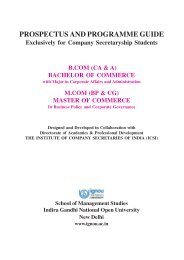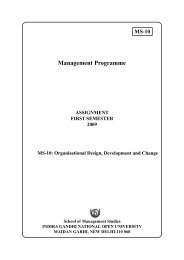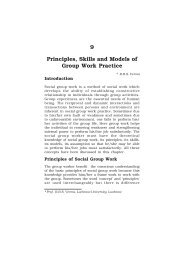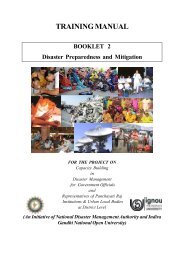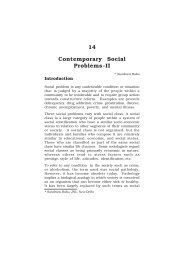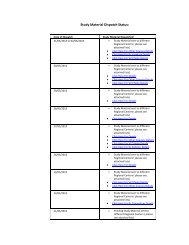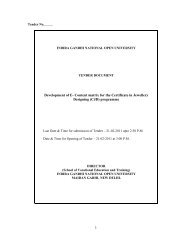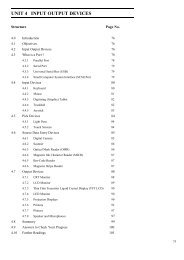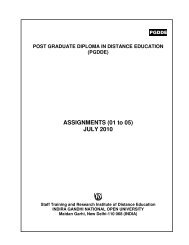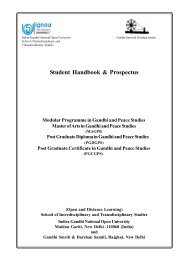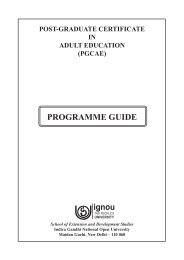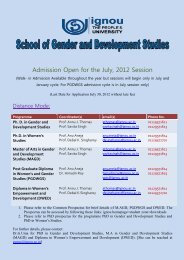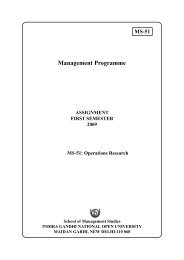PROSPECTUS AND PROGRAMME GUIDE - IGNOU
PROSPECTUS AND PROGRAMME GUIDE - IGNOU
PROSPECTUS AND PROGRAMME GUIDE - IGNOU
You also want an ePaper? Increase the reach of your titles
YUMPU automatically turns print PDFs into web optimized ePapers that Google loves.
3. Decision Making Tools<br />
Marginal costing, break even analysis and its applications in decision making; Absorption costing as a system of<br />
profit reporting and stock valuation; Throughput accounting as a system of profit reporting and stock valuation;<br />
Activity-based costing for profit reporting and stock valuation; Integration of standard costing with marginal<br />
cost accounting, absorption cost accounting and throughput accounting; Process costing including establishment<br />
of equivalent units in stock, work-in-progress and abnormal loss accounts and use of various methods like firstin-first-out,<br />
average cost and standard cost methods of stock valuation.<br />
4. Budgeting<br />
Budget Concepts and Preparation; Fixed and Flexible Budgets; Time series analysis including moving totals and<br />
averages, treatment of seasonality, trend analysis using regression analysis and the application of these techniques<br />
in forecasting product and service volumes; Fixed, variable, semi-variable and activity-based categorizations of<br />
cost and their application in projecting financial results; Zero base budgeting.<br />
5. Standard Costing<br />
Manufacturing standards for material, labour, and overhead; Price/rate and usage/efficiency variances for materials,<br />
labour and overhead. Further subdivision of total usage/efficiency variances into mix and yield components;<br />
Fixed overhead variances; Planning and operational variances; Sales price and sales revenue/margin volume<br />
variances (calculation of the latter on a unit basis related to revenue, gross margin and contribution margin).<br />
Application of these variances to all sectors, including professional services and retail analysis; Interpretation of<br />
variances: interrelationship, significance; Benchmarking for setting standards.<br />
6. Costing and performance management<br />
Business performance measurement for performance improvement.<br />
7. Recent trends in cost and Management Accounting<br />
Objectives<br />
Course 13<br />
BCO-049: Operation Management and Information Systems<br />
To gain knowledge of Operation Management, Production planning and resource management and to develop<br />
understanding of Information Technology and its use in business environment.<br />
Learning Aims<br />
●<br />
●<br />
●<br />
●<br />
●<br />
●<br />
●<br />
●<br />
Knowledge of Operation Management<br />
Knowledge of Production planning and resource management<br />
Knowledge of data structures and Algorithms<br />
Identify opportunities for the use of information technology (IT) in organisations, particularly in the<br />
implementation and running of the information system (IS);<br />
Knowledge of IS analysis and design.<br />
Learn software engineering and Objective Oriented Programming<br />
Evaluate and Analyse MIS<br />
Knowledge of BPOs<br />
Skill set required<br />
Level B: Requiring the skill levels of knowledge, comprehension, application, and analysis.<br />
A-36



